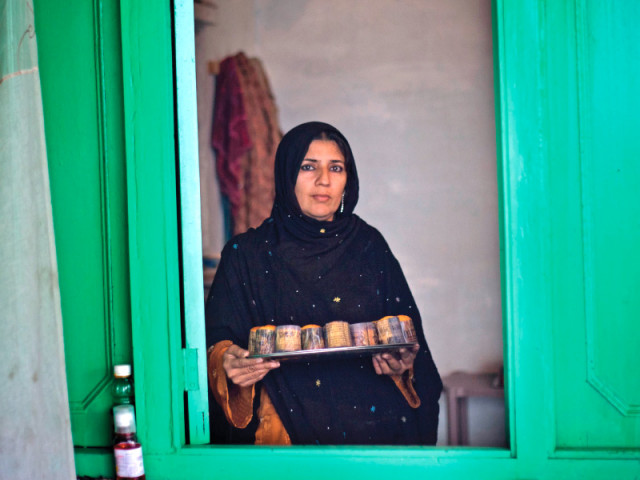Women find modest success after training, loans
Ruqia, Munawar, Rehmat and Parveen all find ways to give back to their communities.

After receiving training, Ruqia is able to add to the household income through her baking. PHOTO: MYRA IQBAL/express
In northwest Punjab, women’s empowerment is not a battle to surpass patriarchs but a struggle to keep apace with poverty-threatening inflation and insularity.
Bright-eyed and soft-spoken Ruqia Akhtar runs a modest bakery from her home in Kalabagh, with the conviction that a single working hand is no longer sufficient, nor reliable, to sustain an entire household.
This understanding has encouraged Ruqia to seek training offered by the National Rural Support Programme (NRSP) and Taang Waasaib organisation and she is now able to supplement her husband’s income with her own.
A recent move from Ruqia’s hometown, Wandha Kukran Wala, a village with a population of a few hundred situated on the periphery of the River Indus, to the relatively urban Kalabagh city has shown her family’s commitment, not only to her business, but also to moving forward.

“It is never places that are backward, it is the people who are backward,” says Ruqia with resoluteness.
Producing four to six dozen cakes, in a dated, square toaster oven and recycled tin containers fashioned by Akhtar, who is a welder by profession, Ruqia supplies her baked goods in Wandha Kukran Wala and her new locality in Kalabagh, in addition to special orders. Through micro-finance loans, Ruqia has been able acquire some basic equipment, such as an electric beater and confectionary books.
Sometimes, there is a man behind a woman’s success. And that man in Ruqia’s case is her husband, Akhtar Hussain, without whose confidence she would never have stepped outside her home.

In Wandha Kukran Wala, there is little trend for education as secondary schools lie across the river and are only accessible in large part, by boat. While mothers like Ruqia believe that 10-rupees is a small price to pay for an education, other parents are reluctant. Educated up to eighth grade, Ruqia is aware of the power of literacy, with both her daughters pursuing a degree. One daughter is pursuing an MSc, while the other is pursuing a Bachelor of Arts degree.
Women’s rights
In similar spirit, Munawar Sultana has devoted her house in Botala, Khushab to educating women. Leaving her husband when he married for the third time, she is the embodiment of courage.

In a large house of mud and brick, dilapidated in parts due to the recent floods, Sultana holds training and awareness-building sessions for women, intervening in their problems when necessary. Recently, she challenged the DPO Khushab over the wani of a 7-year-old girl. Munawar was able to recover the young girl through a legal appeal.
Birth attendant
Located across the blue-green waters of the Indus is the village Mari, where birth attendant Parveen believes that the 2010 floods changed the role of women in her village for the better.
The 55-year-old woman, who joined the local council formed under the aegis of NRSP, was able to battle her husband’s unforeseen handicap five years ago through the birthing knowledge she gained in a training course in Islamabad. A joint committee fund allowed her to take out a loan to expand her house, get her children married and purchase a television and refrigerator. As Parveen relates these successes, her husband chokes back tears, disappointed in his inability to provide for his family.

Literacy centre
Isolated from schools and markets, and from much of the rest of the village, 20-year-old Rehmat Khatoon runs a literacy centre in a bare concrete room in her house in Goliwala, Khushab.
With approximately 2,500 households, Goliwala lies off a pebble-strewn road, where cotton-laden trucks make their way leaving behind their snowy trails for young boys to catch in their folded shirts. The nearest school is a Rs35 rickshaw ride away. Rehmat, who is enrolled at the Allama Iqbal Open University in Quaidabad, studies in large part at home, only going to university to take exams.
Rehmat invites young women from her neighbourhood to her home, in an effort to engage and motivate them, during a two-hour session each afternoon, with the goal to create awareness about their rights and roles. For her efforts, Rehmat, who was trained by NRSP, earns Rs4,000 a month from Action Aid.
“A lot of parents are still not supportive of female education,” she explains, “there is ignorance in every part of this village.”
Published in The Express Tribune, February 12th, 2013.



















COMMENTS
Comments are moderated and generally will be posted if they are on-topic and not abusive.
For more information, please see our Comments FAQ